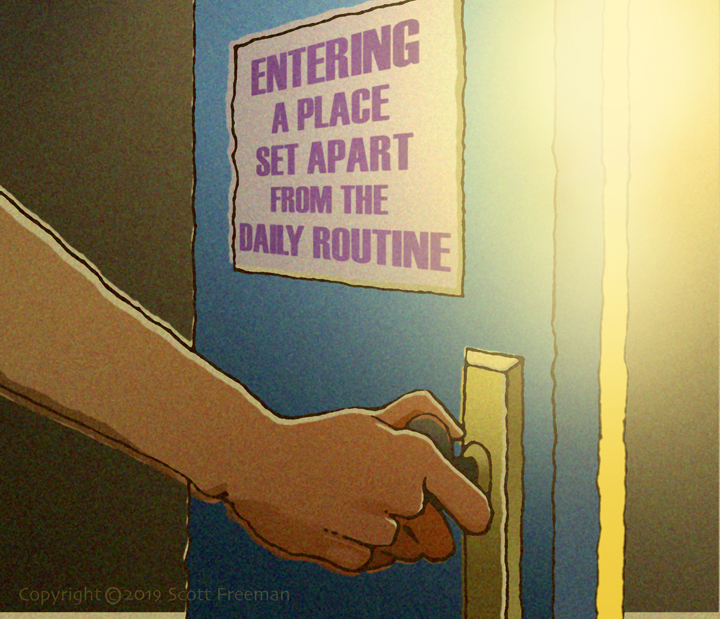A quick publishing note before the main post: I’m back at work on my next kids’ book, The Friendly City, and plan to have it ready this fall. Following is a piece I posted on my secular blog, which I hope you will find worthwhile…

I’m seeing a lot of defensiveness from conservatives regarding racism. This is understandable, as the Left continues pushing to redefine racism to include things such as breathing and having a job.
But being defensive isn’t helping anyone. Is it really too much to ask that we try to see the world from our Black neighbors’ perspective? To empathize with them? To face America’s racist past?
Here’s a clear example of what I’m seeing. Last week I read an article about Max Lucado publicly repenting at length for his ancestors’ sins of racism. The majority of comments following said things like this:
> My dad said his father was a horse thief…do I need to beg for forgiveness for his sin? If I do, do I get to hear honking cars afterwards?
> Lucado is trying to sell more books. No where in scripture does it suggest you repent of the sins of your ancestors… Slavery and racism has (sic) been present since the beginning of time.
> This is ridiculous. Licado (sic) needed attention and sell books (sic)…..that was 150 years ago…get over it.
Stuff I Didn’t Learn in School
I’ve spent the last few weeks re-learning the history of Black America. I was born in 1960 – ninety-nine years after the start of the Civil War. I thought I knew this stuff. What I’ve realized is that I mostly learned about the good parts – the civil rights victories, Rosa Parks, Martin Luther King Jr., and how America finally got it right. I never really learned about just how bad things were for Black Americans during the 100 years after the Civil War, before the “civil rights era.”
I recently listened to a talk by Bryan Stevenson, attorney and author of Just Mercy. Stevenson carries a lot of moral authority with me because of his tireless work on behalf of people on death row who have been wrongly convicted. He contends that America has never truly come to grips with its racist past, and that this is a necessary step in order for healing to actually occur as a nation. I agree with him.
I suppose most white folks, myself included, have assumed that because equal rights have been established on a policy level, then we’ve basically solved the problem. We live and work next to our Black fellow Americans and we all get along just fine now.
May I ask something of you? I am not suggesting that you need to repent of your ancestors’ sins. Repentance is not the point for you today if you do not hold racist beliefs or attitudes, imo. What I think is in order is that we grieve with, feel with, and empathize with, our Black brothers and sisters. I’ve compiled a brief timeline of post–slavery American history. I think you will find some surprises, as I did.
TIMELINE:
1863 – THE EMANCIPATION PROCLAMATION is issued by Republican President Lincoln during America’s Civil War over slavery. The Proclamation declares that slaves residing in the warring Confederate states are “then, thenceforward, and forever free.” Southern whites insist that Lincoln’s executive order is illegal and refuse to comply.
1865 – THE 13TH AMENDMENT is ratified, formally codifying the Emancipation Proclamation, prohibiting slavery throughout the United States, “except as punishment for crime.”
1865 – THE CIVIL WAR ENDS. LINCOLN IS ASSASSINATED 6 DAYS LATER. Democrat Vice President Andrew Johnson assumes the presidency but proves to be soft in his commitment to implement Reconstruction efforts and to protect newly recognized Black citizens. Among other things, Johnson opposes Black voting rights.
1866 – WHITE MOB VIOLENCE in Memphis and New Orleans leaves nearly 100 Blacks citizens dead, and some 200 wounded, including at least 5 women raped. White police officers contribute to the violence and killing until federal troops arrive.
1866 – REPUBLICANS WIN A VETO-PROOF SUPER-MAJORITY IN CONGRESS as a result of public outrage over the Memphis and New Orleans attacks. Progressive Republicans embark on an aggressive civil rights program the likes of which wouldn’t happen again for 100 years.
1866 – THE CIVIL RIGHTS ACT is passed, over President Johnson’s veto, declaring Black Americans full citizens entitled to equal rights.
1866 – THE 14TH AMENDMENT IS PASSED by the super-majority, but will require ratification by 28 of the 37 states in order to become constitutional law. The proposed amendment establishes that all persons born in the US, regardless of race, are full citizens of the US and of the states in which they reside and are entitled to the “privileges and immunities” of citizenship, due process, and the equal protection under the law. 10 of 11 former Confederate states reject the proposed amendment overwhelmingly.
1867 – THE RECONSTRUCTION ACTS OF 1867 are passed by the super-majority, over President Johnson’s veto, in response to the former Confederate states’ rejection of the 14th amendment. The Acts require former Confederate states seeking readmission to the Union to fulfill the Acts’ conditions. Former states would be required to ratify the 14th amendment, grant voting rights to Black men, accept federal military rule in the southern region, and draft new constitutions to be approved by congress.
1868 – THE 14TH AMENDMENT IS OFFICIALLY ADOPTED. White backlash, violence, and efforts to maintain white supremacy continue in earnest.
1870 – THE 15TH AMENDMENT IS PASSED – the third and last of the Reconstruction amendments. It states, “The rights of citizens of the United States to vote shall not be denied or abridged by the United States or by any state on account of race, color, or previous condition of servitude.” Subsequently, Black voters turn out in droves and more than 600 African Americans are elected as state legislators. The US Congress adds 16 Black representatives, and Mississippi elects the nations first two Black senators. The new racially integrated Reconstruction governments set about repealing racially discriminatory laws. Instability grows as whites in the South refuse to accept what is happening.
1870-71 CONGRESS PASSES A SERIES OF ENFORCEMENT ACTS, including the Ku Klux Klan Act of 1871, authorizing, among other things, the federal government to prosecute civil rights violations as crimes. Republican President Grant supports progressive Reconstruction and provides federal troops to enforce it, as state governments are powerless to stop widespread violence and upheaval.
1872 – THE SUPREME COURT BEGINS ISSUING RULINGS THAT NEUTRALIZE RECONSTRUCTION. One of the worst is the 1876 United States vs Cruikshank decision. Incredibly, the Cruikshank ruling interprets 14th amendment protections as only applying to state offenses, not against violence perpetrated by individuals, rendering the Enforcement Act useless. Cruikshank leaves Blacks in the South defenseless against white perpetrators so long as they act privately. As a result, anti-Black violence in the South openly increases as white perpetrators act with impunity, knowing that racist state judicial systems and law enforcement will not punish them. This marks the beginning of the end of a mere 10-year period of hope and positive development for Blacks in America, until the civil rights era of the 1960s.
1876 – THE END OF RECONSTRUCTION. The 1876 presidential election ends in a stalemate between Democrat Samuel J. Tilden and Republican Rutherford B. Hayes. The Supreme Court and Congress develop a compromise whereby Hayes would become president if he would agree to end Reconstruction. The “unwritten” Compromise of 1877 resulted in all remaining federal troops being pulled out of southern states, and the agreement that the South would have the right to deal with Blacks without northern interference. This leaves southern Blacks with no legal recourse and virtually no protection, relegating them to an inferior status in a hostile society.
Here I will end the timeline, and summarize for purposes of brevity.
In the ensuing decades, especially in the South, a white supremacist society intentionally and often violently terrorized Blacks in order to “keep them in their place.” Despite the fact that equality between the races was encoded into federal law, the notion of white supremacy remained entrenched at every level of white society in the former slave states – in the general population, in the education establishment, in churches, in civil law, in law enforcement, in the legal system, and in state government.
Racial separation and inequality were enforced by many means including:
> rewriting state constitutions and Laws, including Jim Crow laws requiring racial segregation
> creating all-white juries to guarantee immunity for perpetrators of racial violence
> physical violence and legal barriers against would-be Black voters
> evicting and/or firing would-be Black voters working for racial equality
> police brutality from officers who were often Klansmen/members of white supremacist groups
> judges who held white supremacist and/or segregationist views
> shutting down public schools to prevent integration, and the widespread creation of all-white schools
> criminalizing peaceful civil rights protests
> sexual violence against Black girls and women
> rioting
> bombings
> lynching
If I may elaborate just a bit on lynching: I had been under the impression, I suppose mostly from movies, that lynching was a somewhat risky and rare phenomenon perpetrated mostly by the KKK under cover of darkness. However, the Equal Justice Initiative (EJI) has documented 4084 lynchings between the years 1877 – 1950. These have been verified from news and other sources from the era. There were unquestionably an untold number of undocumented lynchings and assaults as well.
It seems clear that “terror lynchings” were perpetrated to send a message to Black citizens who had hopes of claiming their newly won rights as full citizens and equals. The message was that if you are Black, this can be done to you or your loved ones if you step out of “your place” as an inferior. The message was that a black person accused by a white person is not worth the time and expense of due process in a courtroom setting.
Many lynchings were public spectacles, with hundreds of white citizens and families in attendance. These were not viewed as fringe acts of extremism, but were mainstream events condoned by white society. Sometimes there would be food and drink, and the victim’s body parts would be handed out to the crowd as souvenirs. This was all openly documented by an often sympathetic press.
What is the point of saying these things now?
This is not the America we live in today. It is true that no one alive today owned slaves or perpetrated a racial terror lynching. No Black person living today was ever a slave. But the appropriate response to Black Americans is not, therefore, “so get over it.” For decades during the post-slavery era, Blacks were left utterly unprotected and what was done to them was horrific, to say nothing of the slavery itself that came before. White America must sorrowfully acknowledge this.
Millions of white supremacist Americans worked tirelessly, voted, and rioted to keep Blacks subjugated. The experience of Black Americans today has been shaped by this history. It should also be said that racial terror and discrimination was not just a “southern problem.” After Reconstruction ended, some 6 million Black Americans fled the South to the North, Midwest, and West, where violence and discrimination often followed – in cities such as East St. Louis, Chicago, Detroit, Tulsa, and Omaha.
Admitting the horror of America’s violent, racist past is a necessary part of national healing and understanding. Doing so is not an admission that America is innately horrible, or that rioting, or the solutions proposed by left wing groups like BLM or M4BL are correct.
But it might help us to understand the anger and frustration. It might help us to understand the eerie familiarity Blacks may feel when a white policeman unjustly kills a Black man and goes unpunished. It might help us to understand how confederate monuments may be seen as celebrations of white supremacy. It might help us to understand why America remains largely segregated, even though overt white supremacy has virtually disappeared from society and its institutions.
It is a basic act of respect toward Black Americans to not sweep their history under the rug. May God give us all grace and understanding to clean house without tearing the house down.
— Scott Freeman, September 2020
For further reading I recommend one or all of EJI’s 4 thin books: Slavery in America; Reconstruction; Segregation in America; & Lynching in America.





